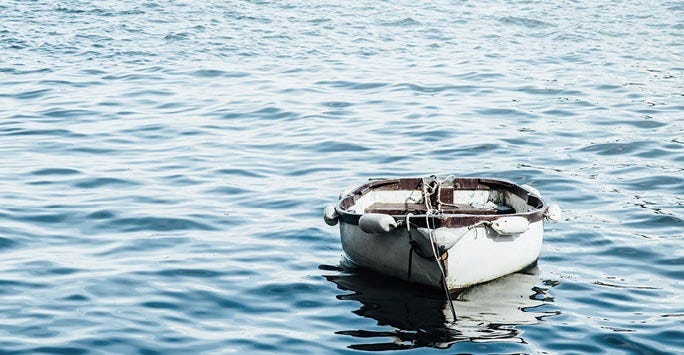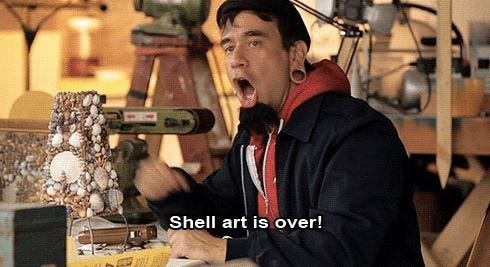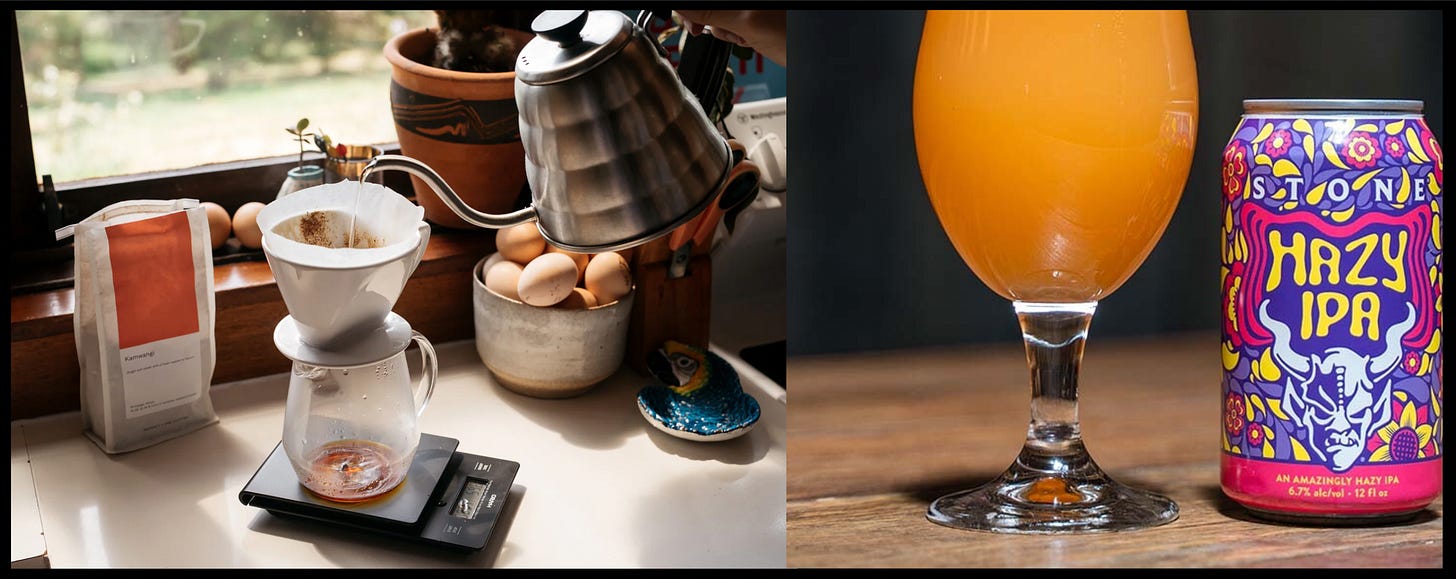So, why “Untethered”?
(Asked literally no one. But let’s pretend someone did, just for the thrill of it!)
“Untethered” is how I came to describe a very particular feeling. A feeling that has led me down countless rabbit holes for the last decade.
This began by noticing the curious ways we describe our lives. I covered the strange intrusion of economic language in my last post, but there’s more to it than that. The fluidity of rapid change sees us scrambling to keep up, move with the times, make our mark, settle down, find our place in the world — and our people — all at the same time.
Oftentimes, the rush is exhilarating, but every now and then, when we pause to check our bearings, we wonder where the heck we are and if this is where we should be. Knowing that we left our home for good reason, but grappling with whether we have anything that will take its place. Do we really belong here? If we stumble now, is anyone there to pick us up?
Even when we’re winning, there can be a sense of unease. When a world of opportunity has just opened up, we second-guess ourselves. “Am I making the most of it? Could I do more? Is this all I could be?”
The Untethered feeling keeps popping up in conversation. Often, it’s just a vague wondering — like scratching at an itch that’s difficult to locate. There’s not really a shared name for it yet. Even so, it feels, if not universal, at least “in the ether”.
I’ve overheard it discussed in cafes. “Do you ever feel like this, or is it just me?” she asks a friend.
“I do!” 🙋🏻♂️ I whisper to myself. (But I generally avoid the impulse to answer questions aloud when they aren’t directed at me — because, apparently, it’s creepy.)
It’s a feeling that has been chewed over around campfires late in the evening with close friends, in moments of kind light and vulnerability.1 It’s one I’ve known all too well myself. Sometimes, it’s paired with pangs of frustration, self-admonishment, confusion, despair. Other times, with relief, excitement, and tingling with possibility.
Which is strange. Because here’s the real problem: Feeling Untethered is complicated.
We may not enjoy feeling Untethered, but we sure as heck don’t want to feel trapped.
It seems that being Untethered is both a goal and a fear. Positively and negatively charged. An asset and a liability.
We have a conflicted relationship with freedom. Not only is it difficult to get to the bottom of what we’re feeling or why we’re feeling this way, but also how we should feel about it.
Other experiences are easier to parse:
Despair. Bad.
Joy. Good.
Heart-break. Bad.
Delight. Good.
Untethered?
Bad?
Good?
Liberated?
Dislocated?
What we’re aiming for?
What we’re terrified of?
Are we free?
Or adrift?
To be tethered is to be held back, and to be Untethered is to be emancipated.
Empowered.
In charge.
A life of possibility.
But to be Untethered can also be to be unseen.
Isolated.
Desperate.
Abandoned.
The freedom we’ve carved out for ourselves can easily become a vacuum.
I moved to Melbourne twelve years ago.
I came from a town that was stable. So stable that it often felt claustrophobic for a personality like mine. Growing up, it seemed everyone remained in the same neighbourhoods, kept the same circle of friends, settled down and raised families. It was a nice life, but I craved diversity. I needed movement and change.2
Moving to the Inner North of Melbourne was both intriguing and energising. If you haven’t been here, just watch Portlandia; you’ll get the general vibe.
I still remember missing out on a street festival in my first week and being devastated. I hadn’t yet realised there was literally always a festival of some kind happening.
It was fluid, fun and full of characters. There were always new people to meet. Everyone had an interesting side project.3 And just as you got to know someone, they were moving to New York or Berlin.
I had gone from somewhere where you knew everyone’s history to a place where you could reinvent yourself every other weekend, and no one batted an eyelid. While I’m sure I had a “dorky anthropologist from the country” vibe happening, I was genuinely fascinated by how unique and interesting everyone was. Finally, a place where “different” wasn’t pejorative.
But in time, the shadow side began to reveal itself. I witnessed the underside of this kind of fluidity — people who felt unseen in crisis, who lived large but were flat broke, who struggled to find friendships that still held intimacy when everyone was sober. I watched friends hit rough patches and suddenly but reluctantly move hundreds of kilometres back home — while others wished they had a family to return to.4
Everywhere, I heard the same stories — that life was exciting and fun and full of possibility but also relentless and exhausting. So many secretly felt adrift. Friendships too often ran as deep as “we haven’t seen each other in ages — we really must catch up!”
“Adult friendships mostly involve sending memes and saying '“we’ll catch up for weeks” but never doing so” — Unknown millenial sage.
In the quiet moments, people reflected that it felt like everything was great as long as things were going well, but they feared that all it took were a few wobbles before they didn’t know where they belonged or who they could really lean on.
No one wants to feel trapped. We’ve been offered a way out into a life of our own making. But after the initial wave of excitement has subsided, we long to feel grounded again. Yet, we are still terrified of being stuck.
It seems we have a complicated relationship to community and care. There appears to be a general Goldilocks and the three-bears dilemma happening where we struggle to get it just right.

It’s tricky to manage the tension between what we want at one time and what we need the next. Between what we’ve experienced in the past that we’re running from and what we hope to build in the future — yet are unsure how.
My sense is that the balance is off. And my fear is that we haven’t all come to terms with the risks. The intoxication of freedom carries the risk of sailing too close to the rocks or not noticing the poor souls who have been pushed overboard and are crying for help in our wake. Yet, having witnessed coercive forms of community up close and the very real struggles many face in toxic systems, we are also right to be cautious.5
We are caught in cross-pressures between narratives of care and independence. And, the more I’ve sat with it, the more I believe that feeling Untethered doesn’t just describe our relationship to community but also to identity: how we measure ourselves — our value, our success and our place in the world. The freedom to recreate and reform is liberating, but it can come with hidden costs.
I know it’s en vogue to be entirely pessimistic about the vapidness of this modern world, but I’m genuinely not. In fact, I’m more cynical about stories that oversimplify history. While there are important treasures in our past, many of which we can learn vital lessons from, we cannot just go back to some imagined “good old days”. Those days certainly weren’t all good for everyone, and some of the holes we’ve dug for ourselves are an overcorrection to the deep pits of despair experienced by so many marginalised communities.
Whether we like it or not, we live in a very different world now. Rebuilding another will take time, care and effort.
This series is an attempt to try and get to the origin of these dilemmas and tease our way through them together.
As we do I want to introduce you to the surprising places my research has led me, and ideas that I cannot shake.
If I started this series telling you that what I really want to talk about is third-order suffering, the living human web, capitalism as a social imaginary, the historical marginalisation of care, the mythology of self-interest, humans as entrepreneurs-of-self, the magic window, the real invisible hand, the decline of collectives, bad readings of Darwin, the fluidising of communities of care, the pitfalls of autonomous individualism, the service industry as a precarious pseudo-safety net, and a whole bunch of other fascinating rabbit holes, then it would have rightly terrified you.
Hopefully, I can do all of that in a way that makes sense. If you want to come on a journey of intriguing ideas, powerful narratives, sinister powerplays, ignorant misinterpretations, liberative cries, words of warning and revolutionary lives that lay behind this dilemma, I can’t wait to share more.
Up next: Bad poetry that might explain all of this better than bad essay writing ever could.
Then, I’ll tell you how this whole project became distressingly autobiographical.
Take care. Talk soon.
Shane.
If you already have too many subscriptions, but want to support my writing as a one off, a lovely way to do that is:
If you want to follow along, or support Untethered ongoing, Subscribe or Upgrade here:
I love hearing your thoughts and reflections, feel free to:
If you want to get in touch, send me a message:
If you want to share this post, there’s a very helpful button called:
“When we look into the heart,
May our eyes have the kindness
And reverence of candlelight.”
—from “Kind Light” by John O’Donohue.
I’m not gonna lie — undiagnosed ADHD probably had quite a lot to do with this.
One of my first colleagues created the original “Dorothy the Dinosaur” costume. I mean where do you go from there?
I say reluctantly because “home” was a place many people felt they had needed to escape to be able to live authentically.
(There is an inverse of Untethered, but that will have to wait for now.)








I personally don't feel untethered much anymore, but I certainly relate and have felt it so often in the past. This was a really interesting read and I look forward to your future essays. I work in the care sector as a support worker, and while I love my job and it makes me feel like I'm making a difference in people's lives, I sit with an uneasy feeling working in a machine that makes *taking care of people* a commodity that can be bought and paid for.
I, for one, feel constantly untethered... or at least unhinged.